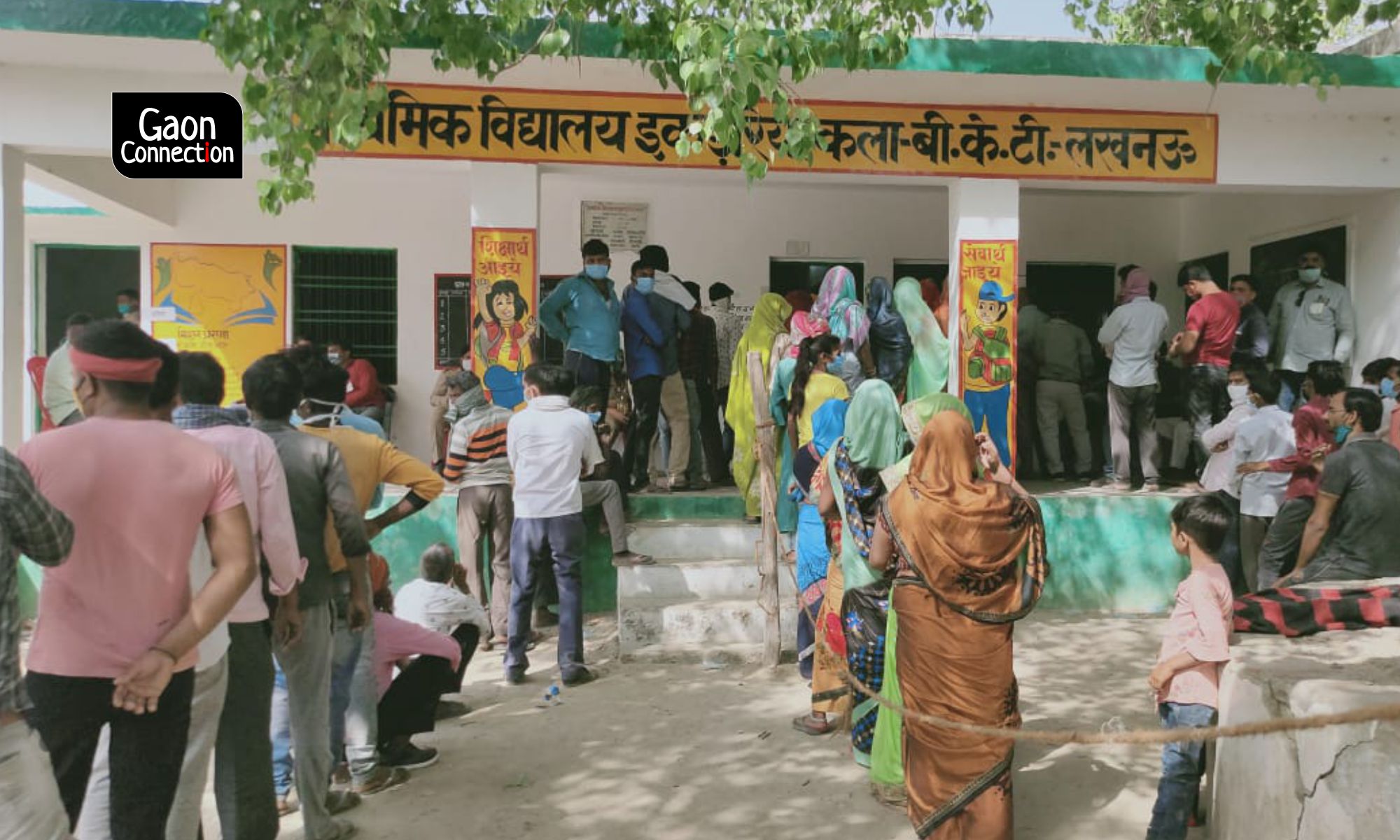Akadariya Kalan, Uttar Pradesh
On April 19, Manish Dwivedi stood at the polling booth in his village of Akadariya Kalan, looking worried. It was the second phase of polling for the UP gram panchayat elections. Over 60 per cent of his village’s 3,500 voters live in Lucknow city and had travelled 30-40 kilometres to cast their votes. And Dwivedi had seen and heard about the number of COVID-19 infections in the state capital.
“The reports from Lucknow hospitals and Bhainsakund [Baikunthdham crematorium] are scary. It is quite possible that many who have come to vote could have carried the infection and spread it among the villagers,” Dwivedi told Gaon Connection.
Dwivedi’s village is situated in the terai region of Gomti river in Lucknow district. A total of 20 districts in Uttar Pradesh went to polls on April 19. These include Lucknow, Gautam Buddha Nagar (Noida) and Varanasi, three places reeling under the impact of COVID-19. Dwivedi’s fear is not without reason.
“This is a village election that happens once in five years, whereby people are likely to come to cast their votes. The government should have postponed the elections,” Dwivedi said.
Akadariya Kalan gram panchayat falls under Bakshi Ka Talab tehsil and includes five villages (Harda, Lasa, Akadariya Khurd, Hirapurwa and Akadariya Kalan). There was a fair amount of hustle-bustle on the 400-metre stretch leading from Akadariya Kalan to the nearby town of Itaunja, via Dughara and Jamkhanwa villages.
Booth agents, relatives and supporters of various candidates for the panchayat and zila panchayat polls and the posts of pradhan gathered in groups, with physical distancing.
Every vote counts in village elections
Kaushal Kishore, an elderly man, sat in the front seat of the car driven by his son. He looked visibly ill. “I suffer from mild weakness, that’s all. I have come here to vote because each vote counts in village elections. Only if one chooses the right pradhan will the village benefit. Pradhanji [the candidate he voted for] had visited us [in Lucknow] and sought my blessings as a son would. So, I had to come,” he told Gaon Connection.
Dwivedi is aware of only one person testing positive for COVID-19 in his village. Although most people wore masks inside the polling centre complex in Akadariya, the recommended distance of two yards was reduced to a foot, and more than half the people removed their masks once outside the polling centres. This was the case in many centres.
Also Read “My wife is the gram pradhan, but I am the real in-charge. You can interview me”
Polling was also underway at the pre-secondary school in Asnaha (BKT) for the Asnaha gram panchayat polls. A policeman was busy stopping people from crowding outside the polling premises. Some of them wore a mask, some had loosely covered their faces with a gamcha (scarf) and most had no mask on.
Masks, sanitisers, vehicle and a vote
“This election is very different from the last election. We have personally distributed masks and sanitisers among voters and advised them to take all precautions. We even arranged vehicles for those from here who live in the cities. A lot of people have come on their own, but many could not make it,” Rajiv Kumar, a candidate for the seat of pradhan from Asnaha gram panchayat, told Gaon Connection.
Kumar refused to speak about the risk of COVID-19 infections, but a group of youth speaking nearby was more forthcoming. “It would have been better had there been no elections, but now since so much time and money have been spent on them, no one will back down, whether there is Corona or not,” one of them told Gaon Connection.
In Kumhrawan, another gram panchayat in the same district, booths had been set up at a local inter college and a school and police and the candidates ensured there was no crowding. Most people were seen wearing masks.
Also Read: Three Tharu tribe women contest the UP panchayat elections. On unreserved seats
“Elections are important but life is even more important,” said Sujit Mishra, the pradhan candidate from Kumharawan panchayat. “A lot of people have come to the village to vote. I had requested only those who were fit to come to vote and the others to not take any risk. Many people have also stayed away,” he told Gaon Connection.
Reduced voting percentage
The website of the Uttar Pradesh state election commission stated that till April 19, 72 per cent polling was recorded in Lucknow district. Azamgarh recorded 64.55 per cent polling, Pratapgarh 60 per cent and Chitrakoot 64.3 per cent.
“Panchayat elections usually record seventy to eighty per cent voting, but this time it is expected to be sixty to seventy per cent because a lot of people may not have gone to vote,” informed social activist Chandrashekhar Pran who runs the Teesri Sarkar campaign to empower panchayats, increase voting percentage and create awareness in panchayat functioning.
Possible spike in cases?
Asked about the possible spread of COVID-19 during the elections, Pran affirmed: “The risk of infection has indeed increased. Elections should have been postponed, but probably since the process had been on the anvil for a long time, it was not done. The risk notwithstanding, I hope what is happening in the cities does not happen here, given the villagers’ immunity level, their food and environment.”
What would have been the impact had the elections been postponed in view of the pandemic? “The elections had been delayed a lot anyway. The more the postponement, the higher the stress and expenditure. They must be conducted now somehow,” a candidate contesting the panchayat elections told Gaon Connection.
During the conversation with Dwivedi, a youth broke in from behind to remark: “The election results might come out only by May 2, but Corona’s effect will be visible much before.” His name? “Adjusting his mask, he said, “What is there in my name or that of my village. But, if you must, the name’s ‘Ranjit Yadav’.”


















